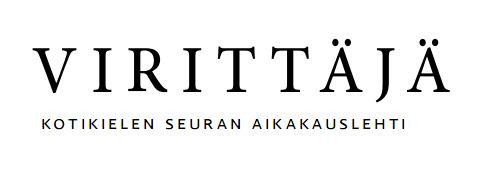Kolmannen infinitiivin illatiivi Petter Schäferin päiväkirjassa
Avainsanat:
infinitiivirakenteet, kaksikielisyys, Schäfer, Petter, syntaksi, vanha kirjasuomi
Abstrakti
The 3rd infinitive illative in the diary of Petter Schäfer (englanti)1/1998 (102)
Pirkko Forsman Svensson (fi)
The 3rd infinitive illative in the diary of Petter Schfer
In the article the writer examines the language of the diary (1707-1714) kept by the Turku scholar Petter Schfer. Schfer recorded his diary notes in Finnish while he was held in prison on account of his Pietist convictions, first at Turku and then at Gvle, Sweden, where he died in 1729.
One of the special features of Schfer's use of language is his frequent and often unusual use of the 3rd infinitive illative. In his diary there are twice as many occurrences of this infinitive than can be found in old Finnish sermon texts or in present-day standard Finnish. This illative form appears in contexts in which would normally be found the 1st infinitive, a participle or a finite verb-form. The 3rd infinitive illative may have been so common in speech in 18th century Turku that it influenced Schfer's use of the form. The use of the 3rd infinitive illative in a way that deviates from present-day usage may be based partly on the practices of old sermons, in which the functions of the 3rd infinitive illative had more shades of meaning than today.
Schfer's unusual use of government (the illative in place of other cases) is, however, hardly evident at all in Finnish sermons of the same period. Schfer's strongest language may in fact have been Swedish and not Finnish, even though he made his diary notes in Finnish. In his other writings Schfer used both Finnish and Swedish, and besides these languages he also translated some of the literature he read into German. On the basis of his writings he can well be regarded as bilingual, although Swedish may have been his first language. This is suggested not only by the language of the diary but also, for example, by his private correspondence, which was in Swedish.
Almost without exception, the equivalent Swedish form of Schfer's unusual 3rd infinitive illatives would naturally be the active or passive (att-) infinitive, often preceded by a preposition. The writer believes that Schfer probably generalised the 3rd infinitive illative into different functions using as a basis on the one hand the multipurpose present infinitive of Swedish, and on the other hand possibly models of the written and spoken Finnish of his time. Models did exist especially for the use of the form in indicating purpose, and this concept of purpose may have been widened on the basis of, for example, the Swedish constructions fr att and till att. This is supported by those cases where use of the illative cannot be justified in Finnish and of which the writer has been unable to find equivalent examples in other 17th and 18th century texts:
poisolles konsistorin neuvoo etsimn away-be-INF2-INES consistory-GEN advice-PART seek-INF3-ILL 'while away seeking the consistory's (capitular body's) advice'
lukko, joka on tallella nyttmn esivallalle lock which be-3Sg safekeeping-ADES show-INF3-ILL authority-ALL 'the lock which is in safekeeping in order to be shown to the authorities'
Certain forms that seem rather artificial serve to indicate that Finnish was not Schfer's stronger language. These forms are his -mAn infinitives with the passive marker (e.g. mistattaman 'to be executed'), which in their contexts must be interpreted as illatives. In addition to the special infinitives, the diary also contains other features which could be explained in terms of his command of Swedish: the main verb is generally inflected with the negative verb; the nominative case is used in place of the partitive with numerals; and the accusative object is used in place of the partitive object with the negative form of the verb. If Swedish is assumed to be Schfer's stronger language, the adoption of the 3rd infinitive illative as a kind of general syntactic form can, on the basis of this, be understood.
Viittaaminen
Forsman Svensson, P. (1998). Kolmannen infinitiivin illatiivi Petter Schäferin päiväkirjassa. Virittäjä, 102(1), 56. Noudettu osoitteesta https://journal.fi/virittaja/article/view/39037





